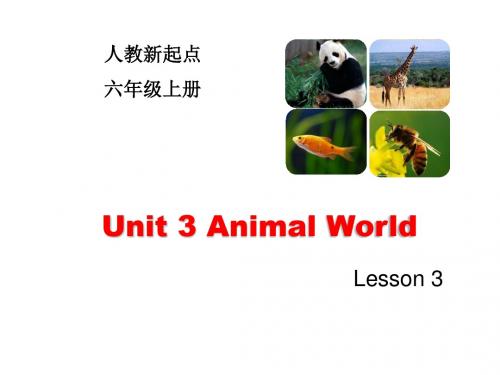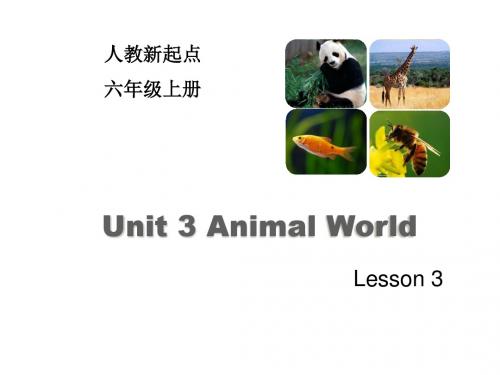六年级英语上册Unit 3 Fun Time_课件1-人教版新起点
人教版(新起点)英语六年级上册Unit 3《Animal World》(Lesson 3)课件

>>Presentation
Listen and answer.
1. What kind of animals are elephants? They are mammals.
2. What do elephants eat?
人教新起点 六年级上册
Unit 3 Animal World
Lesson 3
>>Warm-up
• Let’s say. What kind of animals are …? They are …
>>Lead-in
Let’s sing.
>>Presentation
A. Let’s read.
Read together
>>Practice
C. Let’s write.
I like tigers. They are mammals. They are yellow and black. They can run fast.
>>Homework
close
They only eat fruit, leaves and grass.
3. Where do elephant live? They live in Africa and Asia.
>>Presentation
Read again and answer questions.
3. What does an elephant look like? The elephant has two long, white teeth called tusks.
人教版(新起点)六年级英语上册Unit 3《Animal World》(Lesson 3)课件

They live in Africa and Asia.
>>Presentation
Read again and answer questions.
3. What does an elephant look like?
The elephant has two long, white teeth called tusks.
人教新起点
六年级上册
Unit 3 Animal World
Lesson 3
>>Warm-up
Let’s say. What kind of animals are …? They are …
>>Lead-in
Let’s sing.
>>Presentation
A. Let’s read.
1. What do you know about elephants?
Read together
>>Practice
C. Let’s write.
I like tigers. They are mammals. They are yellow and black. They can run fast.
>>Presentation
Listen and answer.
1. What kind of animals are elephants? They are mammals. 2. What do elephants eat? They only eat fruit, leaves and grass. 3. Where do elephant live?
人教版(新起点)小学英语六年级上册《Around the World》(Fun Time)教学设计

Unit2 Fun Time教学设计【课时】Fun Time一、教学目标1. 能够借助图片读懂Fun Time的基本信息,并尝试进行小制作。
2. 学唱与本单元话题相关的歌曲。
二、教学建议A. Good to know.1. 复习热身,导入新话题(1) 介绍喜欢的国家教师为学生提供景物图片及关键词,学生结对,就一个国家展开交流,如:The UK is in Europe. London is a city in the UK. People there speak English. You can go to Big Ben and London Bridge ...(2) 教师总结,告诉学生他们在本单元了解了很多国家,了解了这些国家的城市及其著名的动物、建筑物等内容,然后自然导入新话题:Today we’ll learn about more countries.2. 学习新知(1) 教师提问:How many countries will we learn about? What are they?学生带着这些问题阅读有关法国和埃及的短文,然后尝试找出答案。
(2) 教师继续提问学生:Where are the countries? What are they famous for? What can we do there? 带着这些问题,学生再次阅读短文,边读边用曲线或直线在文中画出关键信息。
(3) 学生结对交流,然后全班一起核对答案,并学习生词。
可以通过根据上下文猜测、和同伴交流、查字典或向老师请教等方式学习生词(Europe, the Eiffel Tower, the Louvre, pyramids, Cairo, the Nile, wind)。
(4) 教师播放录音,学生跟读。
(5) 学生可以选择喜欢的国家进行朗读或介绍。
(6) 教师可以组织学生开展“小小播音员”活动,请学生选择一段自己喜欢的内容进行朗读比赛。
人教版六年级上册Unit3课件

-What a_r_e _th_e_y going to do? -_T_he_y__ar_e_g_o_in_g_t_o__se_e_a__f_ilm__.
-What a_r_e__th_e_y__g_o_in_g_t_o__d_o? -T_h_e_y_a_r_e_g_o_in_g_t_o_t_a_ke__a_t_r_ip.
I’m going to __________ _________.
Oct. 15th
Sun.
I’m going to v_is_it_m_y__gr_a_nd_p_ar_e_nt_s t_o_m_o_rr_o_w.
My Weekend Plan
do homework
this morning
go to the supermarket this afternoon
go hiking tomorrow
Grandma, w_h_a_t__a_r_e_y_o_u__g_o_in_g__t_o_d_o__t_om__o_r_ro_w_? We’re going hiking.
take a trip next week
We are going to take a trip _n_e_x_t_w_e_e_k_.
Both Amy and her grandparents will have a good weekend.
联系上下文,猜一猜划线句子的意思
玩得开心点! (必须得…) 我现在得做作业了。
Let’s talk P24 点此超链接
Read after it 对话跟读
A Learn P25
Enjoy the song 点此歌曲超链接
It’s Saturday. This is my weekend.
人教版六年级英语上册Unit 3 Part A 课件1

• 一般现在时:用动词原形表示,但单数 第三人称后要加-S 表示经常性或习 惯性的动作
• 一般现在进行时:主语+be+动词ing 表示正在做某事。
一般将来时: bHale Waihona Puke going to+动词原形
一般将来时表示将来某一时刻的动 作或状态,或将来某一段时间内经 常的动作或状态。
this morning afternoon
this
this evening
tonight tomorrow next
visit my grandparents
see a film
go to the supermarket
take a trip
What are you going to do today?
I am going to see a film.
this morning afternoon
this
this evening
tonight tomorrow next
week
Answer the questions:
What is Sarah going to do tomrrow?
She is going to… What is Mike going to do tomrrow? He is going to…
Talk about your and your fiends’ weekend plan.
What is …going to do? He/She is going to … What are …going to do? I’m going to… They are going to …
Unit 3 Animal World Fun Time (教案)人教新起点版英语六年级上册

Unit 3 Animal World Fun Time (教案) - 人教新起点版英语六
年级上册
教学目标
•了解动物世界的不同生物类别和特点;
•学习使用动物词汇及其构词法,并会在情境中运用;
•能够用英语谈论动物的饮食习性和生存环境。
教学重点
•动物词汇及其构词法;
•谈论动物的饮食习性和生存环境。
教学难点
•深入理解动物的生存环境和适应能力;
•运用动物词汇和句型进行自我表达。
教学过程
Step 1 导入
1.引导学生观看一段有关动物的视频,让他们自由观看,并在观看结束后询问学生对视频的看法。
Step 2 学习动物词汇及其构词法
1.老师以图文并茂的方式展示各种不同类别的动物,同时介绍其特点和生存方式。
•鸟类 Bird
–特点:羽毛、嘴巴像喙、会飞
–构词法:+s 表示复数,-s 表示单数
•哺乳类 Mammal
–特点:产奶喂幼、温血动物、体毛覆盖
–构词法:+s 表示复数,-s 表示单数
•爬行类 Reptile
–特点:皮肤坚硬、多鳞片、生蛋
–构词法:+s 表示复数,-s 表示单数
•两栖类 Amphibian
–特点:肌肉发达、冷血动物、幼年时生活方式像鱼类
–构词法:+s 表示复数,-s 表示单数
2.老师让学生自己编写一个有关动物词汇的小册子,并告诉他们如何选择是否表述多义词汇的特点。
例如,缩略版顶部将为“动物及其特点。
PEP六年级英语上册Unit 3第一课时课件_11-15

7
课件在线
5
啊!我向四周一看:我的臣民,小虫儿,小螃蟹,小蝌蚪都在畏缩地向我致敬。当她看到商人一副充满忧愁的面容,听到他的叹息,便站往了。受宠若惊的鸭子立 刻接受了这份爱。 韩国污漫大全 https:///
“唉,谁说不是呢?真羡慕你呀!我可从来没有你这样闲情逸志过,整天东蹦西跳的,玩得多开心。但它远远地停在洞口,对着教徒说: “你只是出于贪婪才到这里来,然而你却忘记了照管好自己的儿子。,将士们想尽了办法,始终都弄不到一滴水喝
What are you going to do this weekend?
We are going to draw some
pictures in the park.
Have a good time!nt
What are you going to do? I’m going to draw some pictures. I’m going to see a film.
What are you going to do?
We are going to have an art lesson.
Have a good time!
课件在线
3
Let’s try
课件在线
4
Watch and choose
1.What is Mike going to do tomorrow? A. He is going to see a film. B. He is going to play football.
What are you going to do?
We are going to have an art lesson.
Have a good time!
人教版六年级英语上册unit3 教学课件

Let’s talk
Mike:What are you going to do tomorrow? Sarah:I'm going to have an art lesson.
Mike:What are you going to do in your lesson? Sarah:We're going to draw some pictures in
Matching dictionary comic book word book postcard
明信片 连环画册 词典 单词书
Practice
make a sentence with the folowing pattern
Where are you going this afternoon?
do homework play computer games read books watch TV
Make some sentences. I’m going to … this weekend. We’re going to … this weekend.
play football play ping-pong swim play basketball
Talk about our classmates’ weekend plan.
What is he/she going to do?
He/She is going to… What are they going to do? They are going to…
book store
book store
Thank you!
